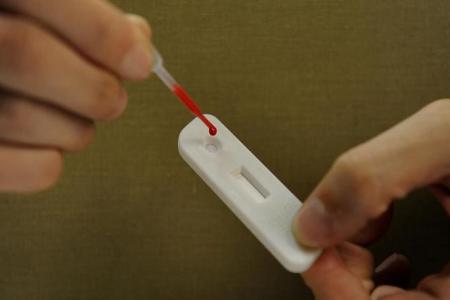HIV self-test swab kits to go on sale from Aug 1, as new cases fall to new low in 2021
Self-test kits for the human immunodeficiency virus (HIV) will go on sale at two locations from Aug 1, even as new cases fell to 250, the lowest in at least 18 years.
The National HIV Programme, which is under the National Centre for Infectious Diseases (NCID), will introduce HIV self-testing to complement widely available tests at healthcare institutions such as polyclinics, hospitals and anonymous HIV test sites, said the Ministry of Health and NCID in a press release on Friday (July 1).
People using the self-test kits will use an oral swab for testing, and results can be obtained within 20 to 40 minutes. The kits, which cost between $20 and $32, will be available at the Department of Sexually Transmitted Infections Control Clinic and the Action for AIDS (AfA) Anonymous Test Site, from August.
Professor Roy Chan, President of AfA, said: "The self-testing programme does not replace existing testing programmes, and we have to make sure that the kits are reliable. But this is another way of reaching our target, which is to end HIV by 2030. The earlier people know they are positive, the earlier they can get into treatment."
Those who test positive through the swab test should go to a healthcare provider to confirm the diagnosis and be referred for treatment, while those who test negative but engage in "high-risk sexual behaviour" - such as having multiple sex partners - are encouraged to test themselves regularly.
"The Ministry of Health and the Health Promotion Board (HPB) urge individuals who engage in high-risk sexual behaviour to go for regular HIV testing," said the Ministry and NCID in the release. "Going for HIV testing is the only way to know one's HIV status. Regular testing and early diagnosis allow persons living with HIV to be treated early and achieve better treatment outcomes.
"This also provides an opportunity to protect their partners from infection as persons living with HIV who are on treatment and have an undetectable viral load have practically no risk of transmitting the virus to their sexual partners. With early and effective treatment, people living with HIV can lead lives no different from others."
The new initiative comes even as the number of new cases fell from "about 320" in 2018 and 2019, and 261 in 2020. The number of new cases ranged from 400 to 500 each year from 2007 to 2017. In total, there were 9,129 Singapore residents diagnosed with the virus in 2021, of whom 2,255 have already died.
Prof Chan said AfA has been working with "target key populations, such as homosexual men, sex workers and heterosexual men with multiple partners" on its prevention programmes.
Some 95 per cent of the new cases last year were male and 68 per cent were aged 20 to 49 years, with 62 per cent having late-stage HIV infection when they were diagnosed.
Of the 250, 237 were infected via sexual intercourse, with heterosexual and bisexual transmission accounting for 33 per cent and 3 per cent of the new cases respectively,and 59 per cent of the cases transmitted through homosexual intercourse.
Some 57 per cent of the new cases last year were detected when the patients were already receiving medical treatment, either for HIV-related symptoms or unrelated ailments, and were typically at a late stage of HIV infection, according to MOH and NCID. Conversely, newly diagnosed patients who proactively went for HIV screening tended to be at the early stage of infection.
"The most effective way to prevent HIV infection is to remain faithful to one's spouse/partner and to avoid casual sex, or sex with sex workers," said the two government bodies. "Persons engaging in high-risk sexual behaviour, such as having multiple sexual partners or engaging in casual or commercial sex, are strongly advised to use condoms to reduce their risk of HIV infection and other sexually-transmitted infections. Condoms should be used consistently and correctly during every sexual encounter."
For more information about HIV self-testing, members of the public can visit www.ncid.sg/nhivp.
Get The New Paper on your phone with the free TNP app. Download from the Apple App Store or Google Play Store now


